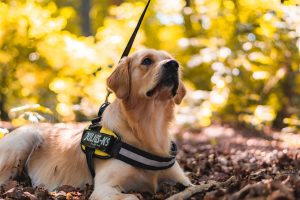SERVICE DOGS AND WHAT YOU NEED TO KNOW

Many people with disabilities use a service animal in order to fully participate in everyday life. Dogs can be trained to perform many important tasks to assist people with disabilities, such as providing stability for a person who has difficulty walking, picking up items, preventing a child with autism from wandering away, or altering a person who has hearing loss when someone is approaching from behind.
The Department of Justice continues to receive many questions about how the Americans with Disabilities Act (ADA) applies to service animals. The ADA requires State and local government agencies, businesses, and non-profit organizations (“covered entities”) that provide goods or services to the public to make “reasonable modifications” in their policies, practices, or procedures when necessary to accommodate people with disabilities.
The ADA defines a service animal as a dog that has been individually trained to do work or perform tasks for an individual with a disability. The task performed by the dog must be directly related to the person’s disability.
Here are some frequently asked questions pertaining to service dogs:
Q: Does the ADA require service animals to be professionally trained?
A: No. People with disabilities have the right to train the dog themselves and are not required to use a professional service dog training program.
Q: What questions can a covered entity ask to determine if a dog is a service animal?
A: In situations where it is not obvious that the dog is a service animal, staff may ask only two specific questions:
- Is the dog a service animal required because of a disability?
- What work or task has the dog been trained to perform?
Staff are not allowed to request any documentation for the dog, require the dog demonstrate its task, or inquire about the nature of the person’s disability.
Q: Do service animals have to wear a vest or patch or special harness identifying them as service animals?
A: No. The ADA does not require service animals to wear a vest, ID tag, or specific harness.
Q: Does the ADA require that service animals be certified as service animals?
A: No. Covered entities may not require documentation, such as proof that the animal has been certified, trained, or licensed as a service animal, as a condition for entry.
Q: Can service animals be any breed of dog?
A: Yes. The ADA does not restrict the type of dog breeds that can be service animals.
Q: Can individuals with disabilities be refused access to a facility based solely on the breed of their service animal?
A: No. A Service animal may not be excluded based on assumptions or stereotypes about the animal’s breed or how the animal might behave. However, if a particular service animal behaves in a way that poses a direct threat to the health or safety of others, has a history of such behavior, or is not under the control of the handler, that animal may be excluded.
Q: Can a person bring a service animal with them as they go through a salad bar or other self-service food lines?
A: Yes. Service animals must be allowed to accompany their handlers to and through self-service food lines. Similarly, service animals may not be prohibited from communal food preparation areas, such as are commonly found in shelters or dormitories.
Q: Can hotels assign designated rooms for guests with service animals, out of consideration for other guests?
A: No. A guest with a disability who uses a service animal must be provided the same opportunity to reserve any available room at the hotel as other guests without disabilities. They may not be restricted to pet friendly rooms.
Q: Can hotels charge a cleaning fee for guests who have service dogs?
A: No. Hotels are not permitted to charge guests for cleaning the hair or dander shed by a service animal. However, if a guest’s service animal causes damages to a guest room, a hotel is permitted to charge the same fee for damages as charged to other guests.
Q: When can service animals be excluded?
A: The ADA does not require covered entities to modify policies, practices, or procedures if it would “fundamentally alter” the nature of the goods, services, programs, or activities provided to the public. Nor does it overrule legitimate safety requirements.
If someone believes that they have been illegally denied access or service because they use service animals, they may file a complaint with the U.S. Department of Justice. Individuals also have the right to file a private lawsuit in Federal court charging the entity with discrimination under the ADA.
Disclaimer: This information is made available by Bagla Law Firm, APC for educational purposes only as well as to give you general information and a general understanding of the law, and not to provide specific legal advice. This information should not be used as a substitute for competent legal advice from a licensed professional attorney in your state.

